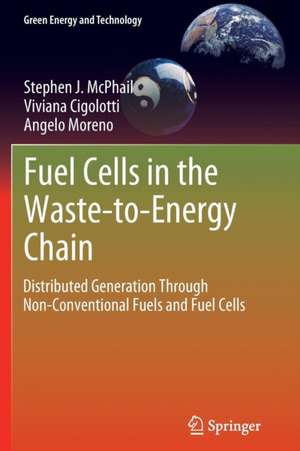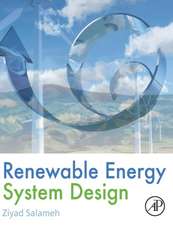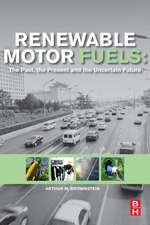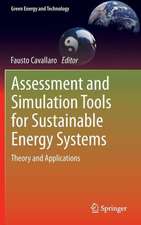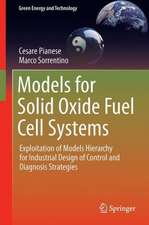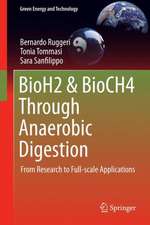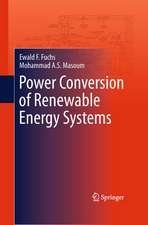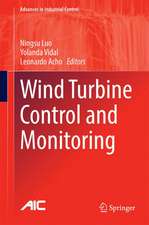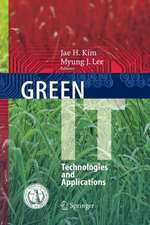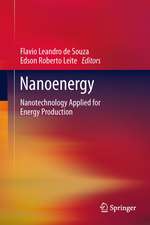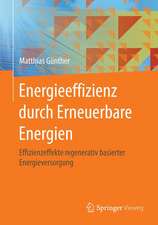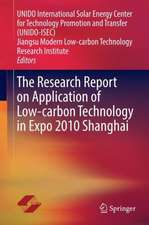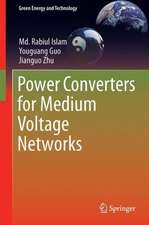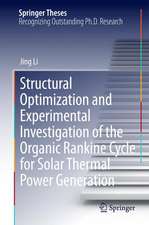Fuel Cells in the Waste-to-Energy Chain: Distributed Generation Through Non-Conventional Fuels and Fuel Cells: Green Energy and Technology
Autor Stephen J. McPhail, Viviana Cigolotti, Angelo Morenoen Limba Engleză Paperback – 22 feb 2014
By providing selected, integrated alternatives to the current centralized, wasteful, fossil-fuel based infrastructure, Fuel Cells in the Waste-to-Energy Chain explores how the concept of waste-to-energy can be constructed and developed into a realistic solution. The entire spectrum of current and future energy problems is illuminated through the explanation of the operational, integration and marketing implications of high efficiency technological solutions using the real context of developed regions such as Europe. Up-to-date reviews are provided on the status of technology and demonstration, implementation and marketing perspectives.
The detailed technological information and insight gathered from over twenty years of experience in the field makes Fuel Cells in the Waste-to-Energy Chain a valuable resource for all engineers and researchers in the fields of energy supply systems and waste conversion, as well as providing a key reference for discussions by policy makers, marketing experts and industry developers working in energy supply and waste management.
| Toate formatele și edițiile | Preț | Express |
|---|---|---|
| Paperback (1) | 941.82 lei 43-57 zile | |
| SPRINGER LONDON – 22 feb 2014 | 941.82 lei 43-57 zile | |
| Hardback (1) | 946.55 lei 43-57 zile | |
| SPRINGER LONDON – 5 ian 2012 | 946.55 lei 43-57 zile |
Din seria Green Energy and Technology
- 18%
 Preț: 943.43 lei
Preț: 943.43 lei - 20%
 Preț: 629.52 lei
Preț: 629.52 lei - 18%
 Preț: 1124.92 lei
Preț: 1124.92 lei - 18%
 Preț: 947.35 lei
Preț: 947.35 lei - 15%
 Preț: 655.92 lei
Preț: 655.92 lei - 18%
 Preț: 957.62 lei
Preț: 957.62 lei - 18%
 Preț: 789.52 lei
Preț: 789.52 lei - 17%
 Preț: 464.56 lei
Preț: 464.56 lei - 15%
 Preț: 645.79 lei
Preț: 645.79 lei - 18%
 Preț: 903.93 lei
Preț: 903.93 lei - 24%
 Preț: 1322.09 lei
Preț: 1322.09 lei - 18%
 Preț: 890.54 lei
Preț: 890.54 lei - 18%
 Preț: 1115.46 lei
Preț: 1115.46 lei - 18%
 Preț: 1117.03 lei
Preț: 1117.03 lei - 18%
 Preț: 949.73 lei
Preț: 949.73 lei - 18%
 Preț: 892.11 lei
Preț: 892.11 lei - 15%
 Preț: 648.24 lei
Preț: 648.24 lei - 18%
 Preț: 997.09 lei
Preț: 997.09 lei - 15%
 Preț: 579.81 lei
Preț: 579.81 lei - 18%
 Preț: 1123.15 lei
Preț: 1123.15 lei - 18%
 Preț: 961.41 lei
Preț: 961.41 lei - 17%
 Preț: 490.23 lei
Preț: 490.23 lei - 18%
 Preț: 904.60 lei
Preț: 904.60 lei - 15%
 Preț: 643.34 lei
Preț: 643.34 lei -
 Preț: 287.91 lei
Preț: 287.91 lei - 24%
 Preț: 634.05 lei
Preț: 634.05 lei -
 Preț: 379.40 lei
Preț: 379.40 lei - 18%
 Preț: 783.20 lei
Preț: 783.20 lei - 18%
 Preț: 1394.84 lei
Preț: 1394.84 lei - 18%
 Preț: 1691.57 lei
Preț: 1691.57 lei - 18%
 Preț: 1112.48 lei
Preț: 1112.48 lei - 15%
 Preț: 592.61 lei
Preț: 592.61 lei - 18%
 Preț: 952.09 lei
Preț: 952.09 lei - 18%
 Preț: 944.19 lei
Preț: 944.19 lei - 18%
 Preț: 891.33 lei
Preț: 891.33 lei - 18%
 Preț: 1252.44 lei
Preț: 1252.44 lei - 18%
 Preț: 789.52 lei
Preț: 789.52 lei - 20%
 Preț: 566.30 lei
Preț: 566.30 lei - 18%
 Preț: 1113.71 lei
Preț: 1113.71 lei - 18%
 Preț: 1114.24 lei
Preț: 1114.24 lei - 24%
 Preț: 590.60 lei
Preț: 590.60 lei - 20%
 Preț: 567.50 lei
Preț: 567.50 lei - 24%
 Preț: 907.50 lei
Preț: 907.50 lei - 18%
 Preț: 952.89 lei
Preț: 952.89 lei - 18%
 Preț: 952.89 lei
Preț: 952.89 lei - 18%
 Preț: 950.52 lei
Preț: 950.52 lei
Preț: 941.82 lei
Preț vechi: 1148.56 lei
-18% Nou
Puncte Express: 1413
Preț estimativ în valută:
180.27€ • 195.88$ • 151.53£
180.27€ • 195.88$ • 151.53£
Carte tipărită la comandă
Livrare economică 21 aprilie-05 mai
Preluare comenzi: 021 569.72.76
Specificații
ISBN-13: 9781447160335
ISBN-10: 1447160339
Pagini: 244
Ilustrații: XIV, 230 p.
Dimensiuni: 155 x 235 x 13 mm
Greutate: 0.34 kg
Ediția:2012
Editura: SPRINGER LONDON
Colecția Springer
Seria Green Energy and Technology
Locul publicării:London, United Kingdom
ISBN-10: 1447160339
Pagini: 244
Ilustrații: XIV, 230 p.
Dimensiuni: 155 x 235 x 13 mm
Greutate: 0.34 kg
Ediția:2012
Editura: SPRINGER LONDON
Colecția Springer
Seria Green Energy and Technology
Locul publicării:London, United Kingdom
Public țintă
ResearchCuprins
Abundance of Waste and Energy Scarcity.- Biomass and Waste as Sustainable Resources.- Anaerobic Digestion.- Biomass and Waste Gasification.- Digesters, Gasifiers and Biorefineries: Plants and Field Demonstration.- Molten Carbonate Fuel Cells.- Solid Oxide Fuel Cells.- Fuel Gas Clean-up and Conditioning.- High-Temperature Fuel Cell Plants and Applications.- Biomethane and Natural Gas.- Electricity and the Grid.- Prospects of Hydrogen as a Future Energy Carrier.- Market and Feasibility Analysis of Non-conventional Technologies.- Concluding Remarks.
Notă biografică
Stephen McPhail is a mechanical engineer, specialising in fuel cell systems, with a PhD in Microfluidics. He has been professionally active in research on high-temperature fuel cells since 2007, especially in combination with renewable energy sources. He authored the chapter "Molten Carbonate Fuel Cells" in the handbook Materials for Fuel Cells, edited by M. Gasik and he also wrote International Status of MCFC Technology. Dr McPhail is a member of IEA Annexes XVIII and XXIV on Molten Carbonate and Solid Oxide Fuel Cells respectively.
Angelo Moreno is a chemical engineer and Head of the High Temperature Fuel Cell Project in ENEA. He is a senior researcher and has been professionally active on high-temperature fuel cells since 1987. Dr Moreno is the author of many international publications and and a contributor to several books, including Biofuels for Fuel Cells. He is an active member in many interest groups and international platforms in the field of high temperature fuel cells, contributing to knowledge transfer and diplomatic exchanges at institutional and diplomatic levels. Since 2008, he has been a member of Research Grouping of the joint undertaking on Fuel Cell and Hydrogen (FCH-JU). Since 2009, he has been a representative for the Italian Ministry of Research in the Member State Representative Group of the FCH-JU.
Viviana Cigolotti is an environmental engineer, with a PhD in Industrial Engineering, Energy Field. She has been professionally active in high-temperature fuel cell research since 2005, especially on the use of non-conventional fuels (from waste and/or biomass) for high-temperature fuel cells, ranging from laboratory activity to feasibility analyses of renewable energy systems. She is a delegate of Italian Ministry of Education, University and Research for the European Project ERA-Net "HY-CO" and is the author of several international publications on these topics.
Angelo Moreno is a chemical engineer and Head of the High Temperature Fuel Cell Project in ENEA. He is a senior researcher and has been professionally active on high-temperature fuel cells since 1987. Dr Moreno is the author of many international publications and and a contributor to several books, including Biofuels for Fuel Cells. He is an active member in many interest groups and international platforms in the field of high temperature fuel cells, contributing to knowledge transfer and diplomatic exchanges at institutional and diplomatic levels. Since 2008, he has been a member of Research Grouping of the joint undertaking on Fuel Cell and Hydrogen (FCH-JU). Since 2009, he has been a representative for the Italian Ministry of Research in the Member State Representative Group of the FCH-JU.
Viviana Cigolotti is an environmental engineer, with a PhD in Industrial Engineering, Energy Field. She has been professionally active in high-temperature fuel cell research since 2005, especially on the use of non-conventional fuels (from waste and/or biomass) for high-temperature fuel cells, ranging from laboratory activity to feasibility analyses of renewable energy systems. She is a delegate of Italian Ministry of Education, University and Research for the European Project ERA-Net "HY-CO" and is the author of several international publications on these topics.
Textul de pe ultima copertă
As the availability of fossils fuels becomes more limited, the negative impact of their consumption becomes an increasingly relevant factor in our choices with regards to primary energy sources. The exponentially increasing demand for energy is reflected in the mass generation of by-products and waste flows which characterize current society’s development and use of fossil sources. The potential for recoverable material and energy in these ever-increasing refuse flows is huge, even after the separation of hazardous constituent elements, allowing safe and sustainable further exploitation of an otherwise 'wasted' resource. Fuel Cells in the Waste-to-Energy Chain explores the concept of waste-to-energy through a 5 step process which reflects the stages during the transformation of refuse flows to a valuable commodity such as clean energy.
By providing selected, integrated alternatives to the current centralized, wasteful, fossil-fuel based infrastructure, Fuel Cells in the Waste-to-Energy Chain explores how the concept of waste-to-energy can be constructed and developed into a realistic solution. The entire spectrum of current and future energy problems is illuminated through the explanation of the operational, integration and marketing implications of high efficiency technological solutions using the real context of developed regions such as Europe. Up-to-date reviews are provided on the status of technology and demonstration, implementation and marketing perspectives.
The detailed technological information and insight gathered from over twenty years of experience in the field makes Fuel Cells in the Waste-to-Energy Chain a valuable resource for all engineers and researchers in the fields of energy supply systems and waste conversion, as well as providing a key reference for discussions by policy makers, marketing experts and industry developers working in energy supply and waste management.
By providing selected, integrated alternatives to the current centralized, wasteful, fossil-fuel based infrastructure, Fuel Cells in the Waste-to-Energy Chain explores how the concept of waste-to-energy can be constructed and developed into a realistic solution. The entire spectrum of current and future energy problems is illuminated through the explanation of the operational, integration and marketing implications of high efficiency technological solutions using the real context of developed regions such as Europe. Up-to-date reviews are provided on the status of technology and demonstration, implementation and marketing perspectives.
The detailed technological information and insight gathered from over twenty years of experience in the field makes Fuel Cells in the Waste-to-Energy Chain a valuable resource for all engineers and researchers in the fields of energy supply systems and waste conversion, as well as providing a key reference for discussions by policy makers, marketing experts and industry developers working in energy supply and waste management.
Caracteristici
This book provides the reader with a realistic solution to today's energy supply problems It also gives up-to-date reviews of technology status, demonstration, implementation and market perspectives Includes supplementary material: sn.pub/extras
